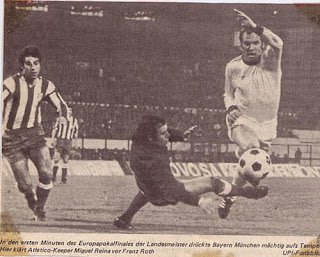International club tournaments were also under heavy criticism. The ugly inheritance from the 1960s reached new level at the Intercontinental Cup – Ajax Amsterdam refused to play and the European Champions Cup runners-up Panathinaikos replaced them in 1971. Next year Ajax played, but Cruiff received death threats in Argentina and had to be heavily guarded. In 1973 Ajax refused again and Bayern also refused in 1974. Liverpool refused in 1977. In 1978 the Intercontinental Cup was not contested at all, and in 1979 Nottingham Forest refused to play. In Europe the Cup Winners Cup was visibly in decline – what was meant to be the second important European club tournament failed to live up to expectations – the once upon a time shaky Inter-cities Fairs Cup was not only stabilized after renamed into UEFA Cup, but became much more attractive tournament for the fans. The reason was quite obvious: in domestic cup tournaments often little clubs won, thus reducing the quality of the international tournament and along with that – the sponsorship revenue. At the same time strong rivals of national champions were playing in the UEFA Cup. But the most acute problem emerged in 1974. The final of the Champions Cup between Atletico (Madrid) and Bayern ended in a draw after 120 minutes (regular time ended 0-0, and both teams scored a goal in the 30 minutes extra time). Under the rules, the match had to be replayed. It was the first time the final ended undecided, and the occasion revealed a complex problem. One side was commercial – what happens now? Were television stations to pay for broadcasting the replay or not? Advertisement and sponsorship? The fans? The final was scheduled for May 15 at the ill-fated (in the 1980s) Heysel Stadium, Brussels. The replay – on May 17. The attendance for the second game dropped alarmingly: from 65 000 at the first match to 23 000 at the second. Hardly a surprise – since finals were and are staged in the middle of the week, people simply could not afford to be absent from work another two days. The crowd at the replay was only 1/3 of the original attendance, leaving the feeling that replay was not generating public interest at all. Quite right, too – after spending their emotions during the first game, people could not bring themselves to the same level of enthusiasm. I remember my own reaction: so excited at the first game, I was hardly interested in watching the second. I was cold and indifferent. Yet, the replay, and not the first match was to decide the Cup winner.
The game itself was hardly a contest – Bayern won 4-0. The two games were dramatically different: the tough Spaniards of the first game did not exist in the second. The Germans, with their supreme physical condition, were fresh in the second match, as if they did not play 120 minutes of physical football less than 48 hours ago. Atletico was entirely exhausted, not even a shadow of the team, which almost won on May 15. It was obvious from the first minute that the replay was unnecessary formality. What the replay revealed in sporting terms was terrible: different training attitudes were to be decisive – for a physically fit and tactically disciplined team it was enough to outrun the opposition, not to outplay it. Dragging the match into extra time or replay, guaranteed victory – a victory achieved by exhausting the opposition, not playing better. After all, Bayern equalized the result in the first match by sheer will – the stopper Schwarzenbeck scored in the 120th minute, the last one! As for Atletico… the truth was, they were not the better team in the first game. They played ugly and calculated football. It will be enough to cite the Celtic fans opinion from the semi-finale opposing Atletico and Celtic (Glasgow): ATLETICO MADRID line-up according to Celtic’s fans: Thug; Psycho, Punch; Spit, Hatchet, Bludgeon; Hammer, Thump, Wallop, Gouge, Axe-Murderer.It was the first and last replay – after that year ties were broken by penalty shoot-outs. The commercial requirements were part of the reason for the change of rules, but not the only reasons. For years it had toyed with ideas for breaking ties in internatinal tournaments. None was satisfactory. At first it was a drop of coin – now, imagine how plausible would be to decide the World Champion by a game of chance. This rule was replaced by the replay – not really a solution and even more troublesome, for now commercial factors were involved. So, the shoot-out… and who likes that? Nobody. Tactical minded football leaves little chances the game to end with a winner – hence, finals are decided by chance… The logical question would be why playing at all.

Miguel Reina, Atletico and former Spanish national goalkeeper, desperately tries to clear the ball from Bayern’s midfielder Franz Roth. Never a national player, Roth will be instrumental in two more Bavarian wins of European Champions Cup, scoring important goals in 1975 and 1976. As for Reina, his name isn’t forgotten yet – but I am speaking of his son. Liverpool anyone?

Ramon ‘Cacho’ Heredia, the Argentinian central-defenseman of Atletico, was a key player in the first final match.

Heredia’s face says it all… the replay spelled doom for Atletico Madrid.

Ruben ‘Raton’ (the Mouse) Ayala and Ramon ‘Cacho’ Heredia moved from San Lorenzo (Buenos Aires) to Atletico (Madrid) in 1973. Only one foreigner was allowed to play by Spanish rules then. Why Atletico did not play Ayala in the final against Bayern, where Spanish rules did not apply, is a mystery. Both played for Argentina in the World Cup 1974. It was a disastrous performance by the Argentines and perhaps the only memorable impression came from Ayala – he was the player with the longest hair among the finalists: 45 centimeters long.
